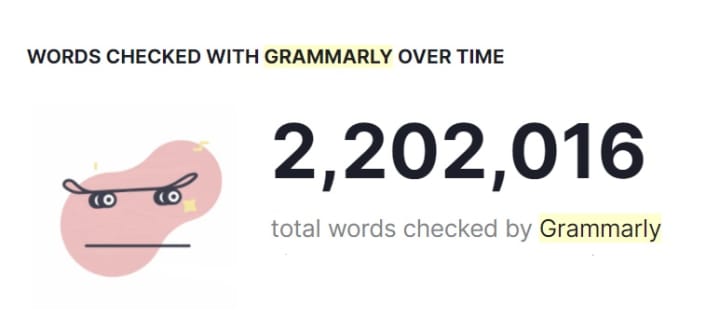Everything I Learned From Editing 2 Million Words in 18 Weeks
This is how Vocal inspired me to become a better writer and editor

The seasoned writer doesn't randomly edit; he stays true to his overarching story showing no mercy to each layer of freshly sowed words. Only then he ascends to greatness.
Write without fear. Edit without mercy. ―Unknown
Vergílio Ferreira once said that we write to meet with our surrogate writer. Hence, we should distantiate ourselves from the story, take a vantage point, and look back at it.
Several weeks have passed since I revamped my career as a content writer on Vocal.

Today, I received a report from Grammarly stating that for the last 18 weeks, I edited a total of 2,361,868 words. Never in my life had I revised that much personal content in so little time.

Moreover, I learned from my short experience here on Vocal the importance of writing to specific niches. Thus, my fellow writer, a piece of advice to you, master your craft, forget about the surrounding noise, focus on Vocal Communities that are in line with your work, and most important, focus on your readers.
The role of a writer is not to say what we can all say but what we are unable to say.―Anaïs Nin
Write without fear
Now a question for you. When you finish writing a story, did you ever had that overwhelming excitement of producing a masterpiece? We all did. That's chemical exhilaration driven by the "feel-good" hormone, dopamine.
Dopamine is a hormone and neurotransmitter that plays an essential part in your brain's reward system. After hours of writing, you experience the relief of a task well done. A dopamine rush across your neuro-network brings you all those pleasurable sensations.
Fueled by this dopamine rush, you start pitching your story to a publication. Afterward, you sit back and relax. Usually, this becomes an excruciatingly long wait, and as time goes by, the dopamine rush is long gone.
Then acetylcholine levels also start to get unbalanced, namely because of stress-related issues that can lead to writer's block. To overcome anxiety, you should immediately set your mind on a new task or a new story.
Acetylcholine is the primary neurotransmitter released from nerve endings in both central and peripheral nervous systems. When levels are optimal, mood is elevated, mind is focused and intelligence increased. But with the low levels learning, recall, ability to think clearly can plummet. "Hormones and Chemicals Linked with our Emotion." ―Dr. Mangalam Ramanathan.
Now let us assume that you kept your energy high, and you are just waiting for the publisher's approval to come and give you that extra boost in self-confidence.
Nonetheless, your unconscious anxiety is still there, as the editorial wheels and cogs turn in a galaxy far away. Suddenly, a cellphone notification and the world comes crashing, as you open your email and find the most dreaded reply:
" ―Your story wasn't accepted by our editorial group. However, we love your work and hope to hear from you again shortly".
You slam the laptops screen against the keyboard, as the first sparks of anger activate the cerebral amygdala before you're even aware of it:
This fires up the hypothalamus that sends signals to the pituitary gland by discharging corticotropin-releasing hormone (CRH).
The pituitary activates the adrenal glands by releasing the adrenocorticotropic hormone (ACTH).
The adrenal glands secrete stress hormones like cortisol, adrenaline, noradrenaline, and you feel an engulfing wave of anger and disappointment.
At this point, you are already screaming your lungs out to a world unaware of your masterpiece.

Edit without mercy
Your thoughts were like flocks of swallows migrating across the furthest continents of your soul. Then you gave them meaning and substance in the form of writing. You opened your hands, so they could fly away and inspire others, but they only flew right back to you.
You go back in and raise the laptop cover again, your fingers locked and loaded, ready to fulfill your narcissistic rage and command prompt the advice given to you. Don't worry... hope to hear from you again shortly.
Refrain from taking the downfall to the abyss of depression! This is not a step you want to be taking after rejection!
Patience you must have my young Padawan! Anger leads to hate. Hate leads to suffering"―Yoda
Calm your nerves, meditate. You have written your story, and it may have turned out pretty good. Rejection shouldn't be the final chapter.
Give it another go!
- Find a better heading or subheading and make these flow better together;
- Revise the structure to increase readability;
- Avoid clustering your ideas, as your text should flow like a river;
- Enhance emotional outreach and focus on the reader;
- Develop your narrative so that it can reach a larger audience for a more extended period.
- Polish your writing as far as you can, share it with your friends and fellow writers.
One story told is better than two left in the drawer! Let the voice of others also echo in your writing. Listen to their feedback and rewrite if necessary.
To write is human, to edit is divine. ―Stephen King
Then go back to sending your story to another editor, and another if you must.
Rest assured that if you do this, your story will indeed get published. I have felt the same disappointment so many times, and to this day, I still believe a writer's heart is always longing, never satisfied!
Thus, you may never write your masterpiece, but you should keep on trying. You will always struggle to overpass your last great piece. Your work is never finished.
For some reason, in U.S. English, we call that little dot that you can find at the end of a sentence, a "period" and not a "full stop."
This emphasizes the transient notion of that tiny dot―as if it was left there at the altar of an untold story yet to come.
Final Thoughts
You never know when a story may resonate with an editor's heart and catch the public eye.
Last week, this happened to me when my article, How I Became a Top Writer Listening to Baby Shark, was handpicked as a Top Story of the day on Vocal.
Who knows, maybe this week you'll write a genuinely unique story, and it will be chosen by Vocal's team of moderators and curators.
Don't ever stop writing. This is the way the world will find out who you are. ―R.J. Ellory
_________________________
Thanks for reading this article and crossing the labyrinth with me. Please feel free to come back at any time and pick up another thread from my Vocal book of content. Till next time, cheers!
-Rui
About the Creator
Rui Alves
Hi, I'm Rui Alves, a teacher, army veteran & digital pathfinder. Author, alchemist of sound & Gen-AI artist.







Comments
There are no comments for this story
Be the first to respond and start the conversation.